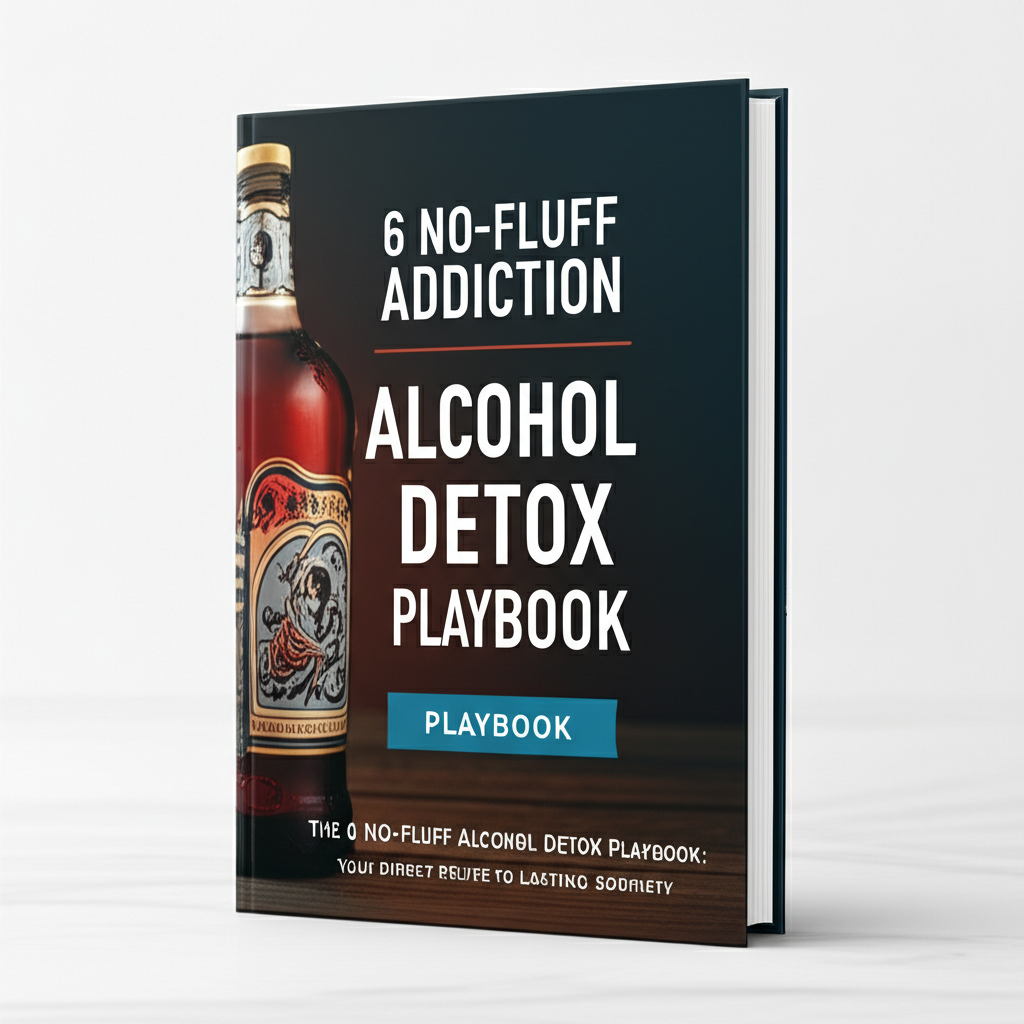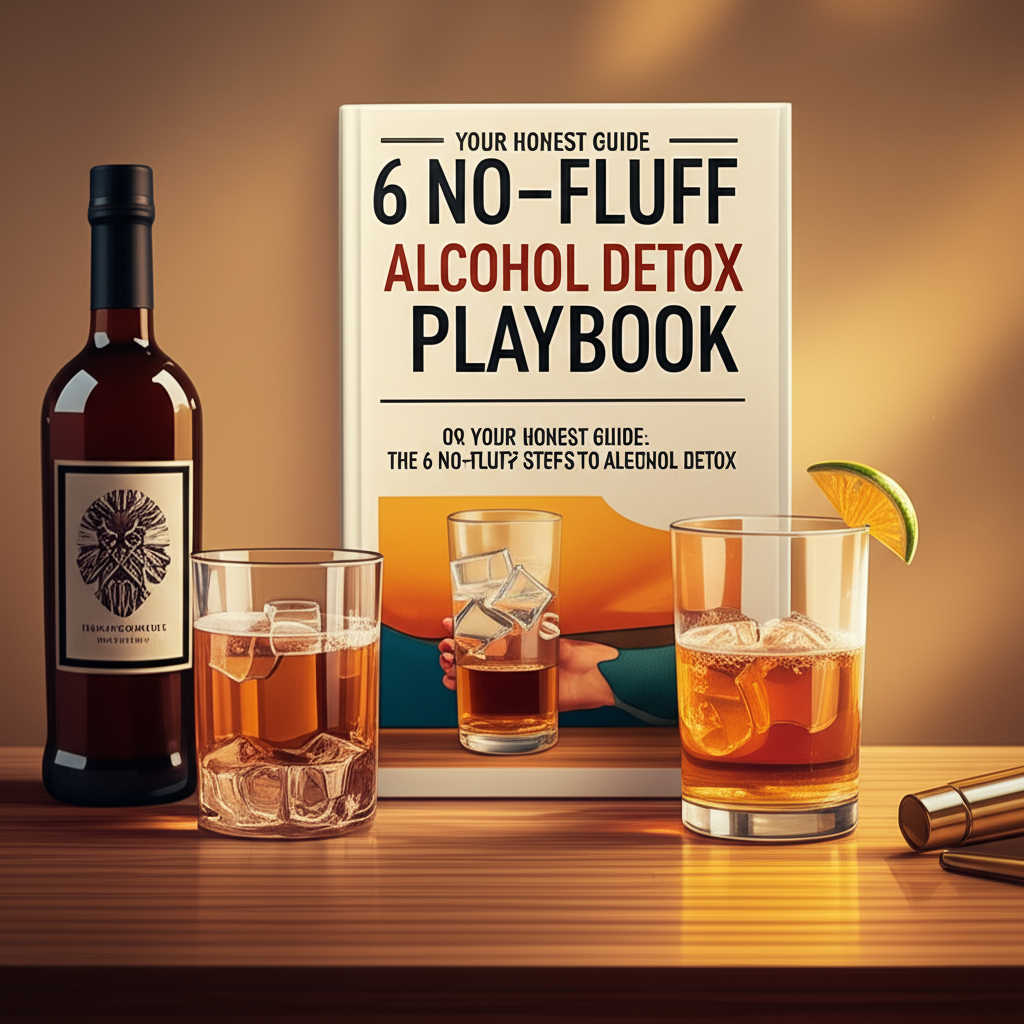The grip of alcohol addiction can feel like an invisible chain, tightening its hold with each passing day. It whispers promises of temporary relief, yet delivers a devastating reality of broken health, strained relationships, and lost potential. For millions, the thought of breaking free – of undergoing alcohol detox – is daunting, shrouded in fear, uncertainty, and the terrifying prospect of withdrawal.
But what if there was a clear, actionable roadmap? A strategic playbook designed not just to survive detox, but to emerge stronger, healthier, and with a sustainable foundation for lasting sobriety? This isn’t just about stopping drinking; it’s about reclaiming your life.
This comprehensive guide is your 3-part actionable alcohol detox playbook, designed to demystify the process, empower you with knowledge, and equip you with the strategies needed for a safer, more effective journey to freedom. We’ll navigate the critical stages: from crucial preparation, through the essential medical detox, and into the vital post-detox recovery and relapse prevention. Let’s unlock the doors to a brighter, alcohol-free future.
Understanding the Alcohol Detox Landscape: Why Professional Help is Non-Negotiable
Before diving into the playbooks, it’s critical to understand the gravity of alcohol withdrawal. Unlike detoxing from some other substances, alcohol detox can be life-threatening if not managed correctly. This isn’t a challenge to be faced alone at home; it’s a medical emergency that requires professional oversight.
Why Detox is Non-Negotiable (Medical Necessity)
Alcohol is a central nervous system depressant. Chronic heavy drinking causes the brain to adapt by increasing excitatory neurotransmitters to counteract the alcohol’s sedating effects. When alcohol is suddenly removed, these excitatory neurotransmitters go into overdrive, leading to a state of hyper-excitability. This is why withdrawal symptoms occur.
- Physiological Dependence: Over time, your body becomes chemically dependent on alcohol to function "normally." It’s not just a bad habit; it’s a profound physiological change.
- Acute Withdrawal Syndrome: This refers to the cascade of symptoms that arise when alcohol consumption is stopped or significantly reduced in a physically dependent individual.
The Dangers of "Cold Turkey" Detox
Attempting to detox from alcohol "cold turkey" at home, especially for individuals with moderate to severe dependence, is incredibly dangerous and can be fatal. The risks include:
- Mild to Moderate Symptoms:
- Anxiety and panic attacks
- Insomnia and nightmares
- Nausea, vomiting, and diarrhea
- Headaches
- Sweating
- Tremors (the "shakes")
- Increased heart rate and blood pressure
- Severe Symptoms (Medical Emergency):
- Alcoholic Seizures: Can occur within 6-48 hours after the last drink. These are generalized tonic-clonic seizures and can lead to injury or status epilepticus (continuous seizures).
- Delirium Tremens (DTs): The most severe form of alcohol withdrawal, typically appearing 2-5 days after the last drink. DTs are characterized by:
- Profound confusion and disorientation
- Hallucinations (visual, auditory, tactile)
- Severe agitation
- High fever
- Extreme autonomic instability (very high heart rate, blood pressure, profuse sweating)
- DTs are fatal in up to 15% of untreated cases.
- Dehydration and Electrolyte Imbalances: Vomiting, sweating, and poor intake can lead to dangerous imbalances.
- Underlying Health Conditions: Withdrawal can exacerbate existing medical problems like heart disease, liver disease, or mental health disorders.
This sobering reality underscores the absolute necessity of a medically supervised detox. It is the safest and most effective first step toward recovery.
Playbook 1: The Pre-Detox Preparation & Planning Strategy
Detox doesn’t begin when you take your last drink; it starts with intentional preparation. This playbook focuses on setting yourself up for success, both mentally and practically, before medical intervention.
1. Self-Assessment: Facing the Truth
The first step is a brutally honest self-assessment of your drinking habits and their impact. This isn’t about shame; it’s about clarity.
- Reflect on Your Relationship with Alcohol:
- How much and how often do you drink?
- Do you drink more than you intend to?
- Have you tried to cut back or stop before and failed?
- Does alcohol interfere with your work, relationships, or health?
- Do you experience withdrawal symptoms when you try to stop?
- Identify Your "Why": What are your deepest motivations for sobriety? Write them down.
- Examples: To be present for your children, to improve your health, to regain trust, to pursue forgotten passions, to feel genuine peace.
- Acknowledge Your Fears: It’s normal to be scared. What specific fears do you have about detox or sobriety? Naming them can help you address them.
2. Building Your Support System
You don’t have to do this alone. A strong support system is a cornerstone of successful recovery.
- Trusted Individuals: Identify one or two close friends or family members you can confide in. Share your intentions and ask for their support.
- Professional Help:
- Primary Care Physician (PCP): Your PCP can assess your overall health, discuss your drinking patterns, and refer you to addiction specialists or detox facilities.
- Therapist/Counselor: A therapist specializing in addiction can help you explore underlying issues, develop coping mechanisms, and prepare mentally for detox and recovery.
- Explore Support Groups: While perhaps not for everyone, attending a few meetings (e.g., Alcoholics Anonymous (AA), SMART Recovery) before detox can provide insights, hope, and a sense of community. You don’t have to commit, just explore.
3. Practical Logistics: Setting the Stage for Success
Practical planning reduces stress and removes potential triggers during the vulnerable detox phase.
- Time Off: Arrange for time off work or other responsibilities. Detox can take anywhere from 3-10 days, with some recovery time afterward.
- Childcare/Pet Care: Secure reliable care for dependents.
- Empty Your Home of Alcohol: Remove all alcohol from your living environment. This means all of it – hidden bottles, cooking wine, mouthwash with alcohol, etc.
- Stock Up on Essentials:
- Healthy Food & Hydration: Easy-to-prepare, nutritious meals, plenty of water, electrolyte drinks.
- Comfort Items: Books, movies, comfortable clothing, toiletries.
- Journal/Notebook: For processing thoughts and feelings.
- Prepare Your Space: Create a calm, clean, and comfortable environment for your return from detox, free from distractions and temptations.
4. Mental & Emotional Priming
Preparing your mind is as crucial as preparing your body.
- Set Clear Intentions: What does sobriety mean to you? How will your life be different?
- Practice Mindfulness/Meditation: Even short sessions can help you manage anxiety and connect with your inner resolve.
- Journaling: Use a journal to express fears, hopes, and motivations. This can be a powerful tool for self-discovery and emotional regulation.
- Visualize Success: Imagine yourself sober, thriving, and enjoying life. This positive visualization can reinforce your commitment.
Playbook 2: The Medically Supervised Detox Execution
This is the critical phase where the physical dependence on alcohol is safely broken under professional medical care. This playbook outlines what to expect and how to navigate this essential step.
1. The Critical Role of Medical Professionals
A medically supervised detox is the gold standard for alcohol withdrawal. It ensures safety, minimizes discomfort, and prevents life-threatening complications.
- Physician Oversight: Doctors, nurses, and other medical staff monitor your vital signs, assess your symptoms, and adjust treatment as needed.
- Medication Management: Medications are used to manage withdrawal symptoms, reduce cravings, and prevent seizures and DTs.
- Benzodiazepines (e.g., Valium, Ativan, Librium): These are the most common medications used. They calm the central nervous system, reducing anxiety, tremors, and the risk of seizures. Dosing is carefully tapered over several days.
- Anticonvulsants: Sometimes used to prevent seizures.
- Nausea Medications: To alleviate stomach upset.
- Vitamins (especially Thiamine): Alcohol depletes essential vitamins, particularly Thiamine (B1), which is crucial for brain function. Supplementation helps prevent conditions like Wernicke-Korsakoff syndrome.
2. Choosing the Right Detox Environment
The best environment for detox depends on the severity of your alcohol dependence, your overall health, and your personal circumstances.
- Inpatient Medical Detox (Residential Detox):
- Description: You reside at a specialized facility for the duration of the detox process (typically 3-10 days).
- Ideal for: Individuals with moderate to severe alcohol dependence, a history of complicated withdrawal (seizures, DTs), co-occurring medical or mental health conditions, or a lack of stable home support.
- Pros: 24/7 medical supervision, structured environment, removal from triggers, focus solely on detox, immediate access to emergency care.
- Cons: Less privacy, can be more expensive, requires time away from home.
- Outpatient Medical Detox:
- Description: You live at home but attend daily medical appointments at a clinic for monitoring, medication, and support.
- Ideal for: Individuals with mild to moderate alcohol dependence, good overall health, a strong and sober support system at home, and a high level of motivation and compliance.
- Pros: Allows you to remain at home, more flexible, generally less expensive.
- Cons: Less intensive supervision, requires significant self-discipline and a safe home environment, higher risk of relapse if triggers are present.
Consult with a healthcare professional (PCP, addiction specialist) to determine the most appropriate setting for your detox.
3. What to Expect During Medical Detox
While every individual’s experience is unique, here’s a general timeline and what to anticipate:
- Initial Assessment: Upon arrival, medical staff will conduct a thorough physical exam, blood tests, and psychological evaluation to create a personalized detox plan.
- Medication Administration: You will begin receiving medications to manage withdrawal symptoms. These are carefully adjusted based on your response.
- Constant Monitoring: Nurses will regularly check your vital signs (heart rate, blood pressure, temperature) and assess your symptom severity using standardized scales (e.g., CIWA-Ar).
- Symptom Management: The goal is to keep you as comfortable and safe as possible. While some discomfort is inevitable, medications significantly alleviate the worst symptoms.
- Nutritional Support: You’ll be provided with nutritious meals and fluids to aid recovery and restore electrolyte balance.
- Rest and Support: You’ll have time to rest and begin preliminary discussions with counselors about your next steps in recovery.
Remember: The medical team is there to help you. Communicate any discomfort, fears, or concerns you have throughout the process.
Playbook 3: The Post-Detox Recovery & Relapse Prevention Blueprint
Detox is just the first step. The real work of recovery begins after the alcohol is out of your system. This playbook provides strategies for building a sustainable, sober life and preventing relapse.
1. Immediate Aftercare: Bridging the Gap
The transition from detox to ongoing recovery needs to be seamless.
- Seamless Transition Planning: Before leaving detox, work with staff to create a detailed aftercare plan. This might include:
- Appointments with therapists or counselors.
- Information on local support groups.
- Recommendations for residential treatment or intensive outpatient programs (IOPs).
- Residential Treatment (Rehab): For many, especially those with severe addiction or co-occurring mental health issues, transitioning directly from detox to a residential treatment facility is highly recommended. These programs offer:
- Structured therapy (individual and group).
- Education on addiction and relapse prevention.
- A supportive, sober community.
- Development of healthy coping skills.
- Intensive Outpatient Programs (IOPs) / Partial Hospitalization Programs (PHPs): These provide structured therapy and support while allowing you to live at home. They’re a good option for those who don’t require 24/7 supervision but need more than weekly therapy.
2. Building a Robust Recovery Toolkit
Sobriety is an active process that requires new skills and tools.
- Therapy and Counseling:
- Cognitive Behavioral Therapy (CBT): Helps identify and change negative thought patterns and behaviors that contribute to alcohol use.
- Dialectical Behavior Therapy (DBT): Focuses on emotional regulation, distress tolerance, interpersonal effectiveness, and mindfulness.
- Motivational Interviewing: Helps you explore and resolve ambivalence about change.
- Family Therapy: Addresses the impact of addiction on family dynamics and helps rebuild healthy relationships.
- Support Groups:
- Alcoholics Anonymous (AA): A 12-step program providing peer support and spiritual growth.
- SMART Recovery: A science-based program focusing on self-empowerment and self-reliance.
- Refuge Recovery: A Buddhist-inspired approach to addiction recovery.
- Women for Sobriety (WFS): A self-help program specifically for women.
- Lifestyle Changes:
- Nutrition: Focus on a balanced diet to heal your body and brain.
- Exercise: Regular physical activity reduces stress, improves mood, and boosts overall health.
- Sleep Hygiene: Establish a consistent sleep schedule and create a relaxing bedtime routine.
- Stress Management: Learn healthy ways to cope with stress (e.g., meditation, yoga, hobbies, deep breathing).
3. Identifying & Managing Triggers
Triggers are people, places, things, emotions, or situations that provoke a craving or desire to drink. Learning to identify and manage them is crucial for relapse prevention.
- Self-Awareness: Keep a journal to track when and where cravings occur. What were you feeling? Who were you with? What were you doing?
- Avoidance: In early recovery, it’s often best to avoid high-risk situations (e.g., bars, parties where alcohol is central, certain social circles).
- Coping Mechanisms: Develop a repertoire of healthy responses when a trigger arises:
- Call your sponsor or a trusted friend.
- Go for a walk.
- Practice mindfulness or deep breathing.
- Engage in a hobby.
- Use positive self-talk.
- Remind yourself of your "why."
- Develop a Relapse Prevention Plan: This written plan outlines your triggers, coping strategies, and who to contact if you feel a relapse is imminent.
4. Embracing Long-Term Wellness & Purpose
True recovery extends beyond simply not drinking; it’s about building a fulfilling life.
- Discover New Hobbies and Passions: Reconnect with old interests or explore new ones that bring joy and purpose.
- Build Healthy Relationships: Foster connections with sober, supportive individuals.
- Set Goals: Establish realistic short-term and long-term goals for your personal, professional, and spiritual growth.
- Practice Self-Compassion: Recovery is a journey, not a destination. There will be good days and challenging days. Treat yourself with kindness and understanding.
- Give Back: Helping others in recovery can be incredibly rewarding and reinforce your own commitment.
Beyond the Playbook: Sustaining Your Sobriety Journey
The three playbooks provide a structured approach, but sustained sobriety is an ongoing journey of growth, resilience, and self-discovery.
The Power of Community
You are not alone. Connecting with others who understand your struggles and celebrate your successes is invaluable. Whether it’s through formal support groups, a sober community, or trusted friends, human connection is a powerful antidote to isolation, a common fuel for addiction.
Relapse is a Detour, Not a Destination
If a relapse occurs, it does not mean failure. It’s a signal to reassess, learn from the experience, and get back on track. The key is to respond quickly, reach out for help immediately, and adjust your recovery plan. Many people experience a relapse on their path to long-term sobriety; what matters is how you respond.
Conclusion: Your Path to Freedom Begins Now
The invisible chains of alcohol addiction can be broken. This 3-part actionable alcohol detox playbook provides a clear, comprehensive, and compassionate guide to reclaiming your life.
- Playbook 1: Pre-Detox Preparation & Planning Strategy empowers you to understand your addiction, build a vital support system, and prepare your life logistically and emotionally for the journey ahead.
- Playbook 2: Medically Supervised Detox Execution emphasizes the absolute necessity of professional medical care to safely and effectively navigate the critical withdrawal phase, preventing dangerous complications.
- Playbook 3: Post-Detox Recovery & Relapse Prevention Blueprint equips you with the tools, strategies, and ongoing support needed to build a robust, fulfilling, and sustainable sober life.
Your path to freedom from alcohol addiction is challenging, but it is entirely possible. By following this actionable playbook, embracing support, and committing to the process, you can move from the grip of dependence to a future filled with health, happiness, and authentic well-being. Don’t wait. Take the first brave step today. Your new life is waiting.








